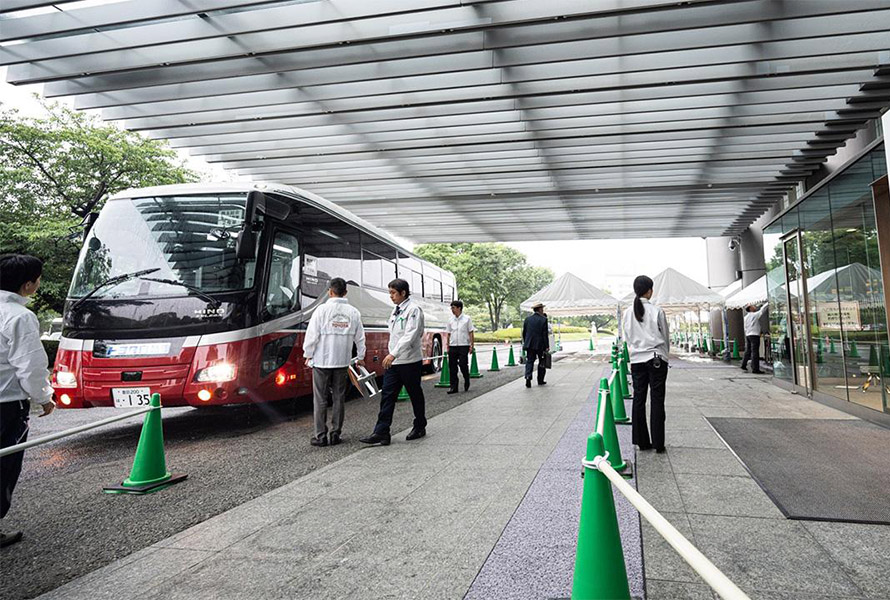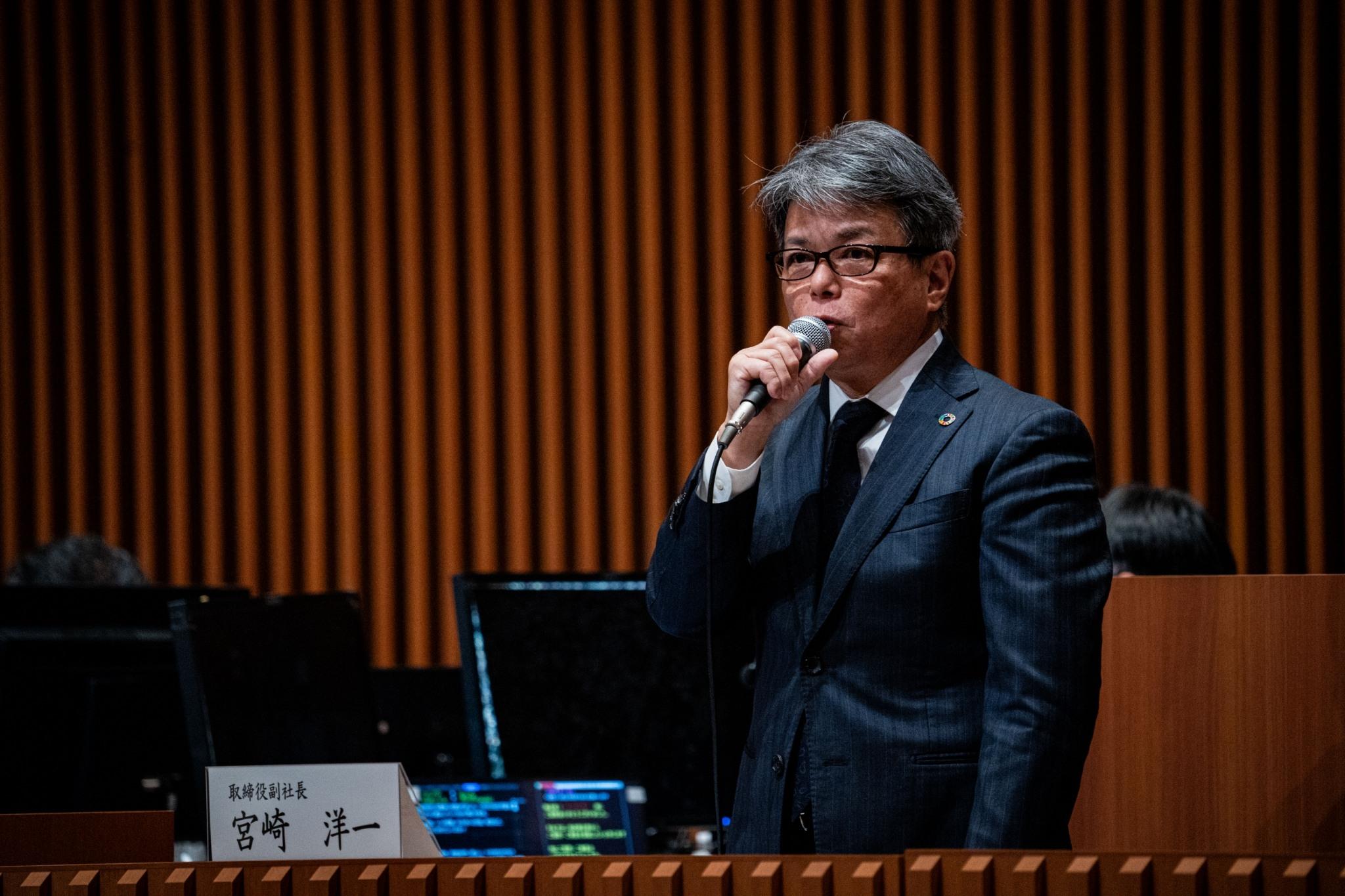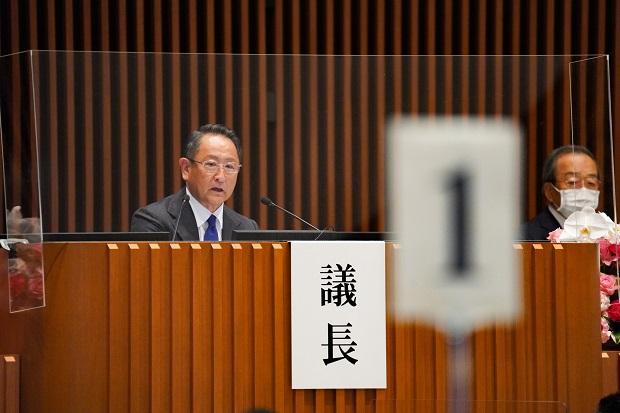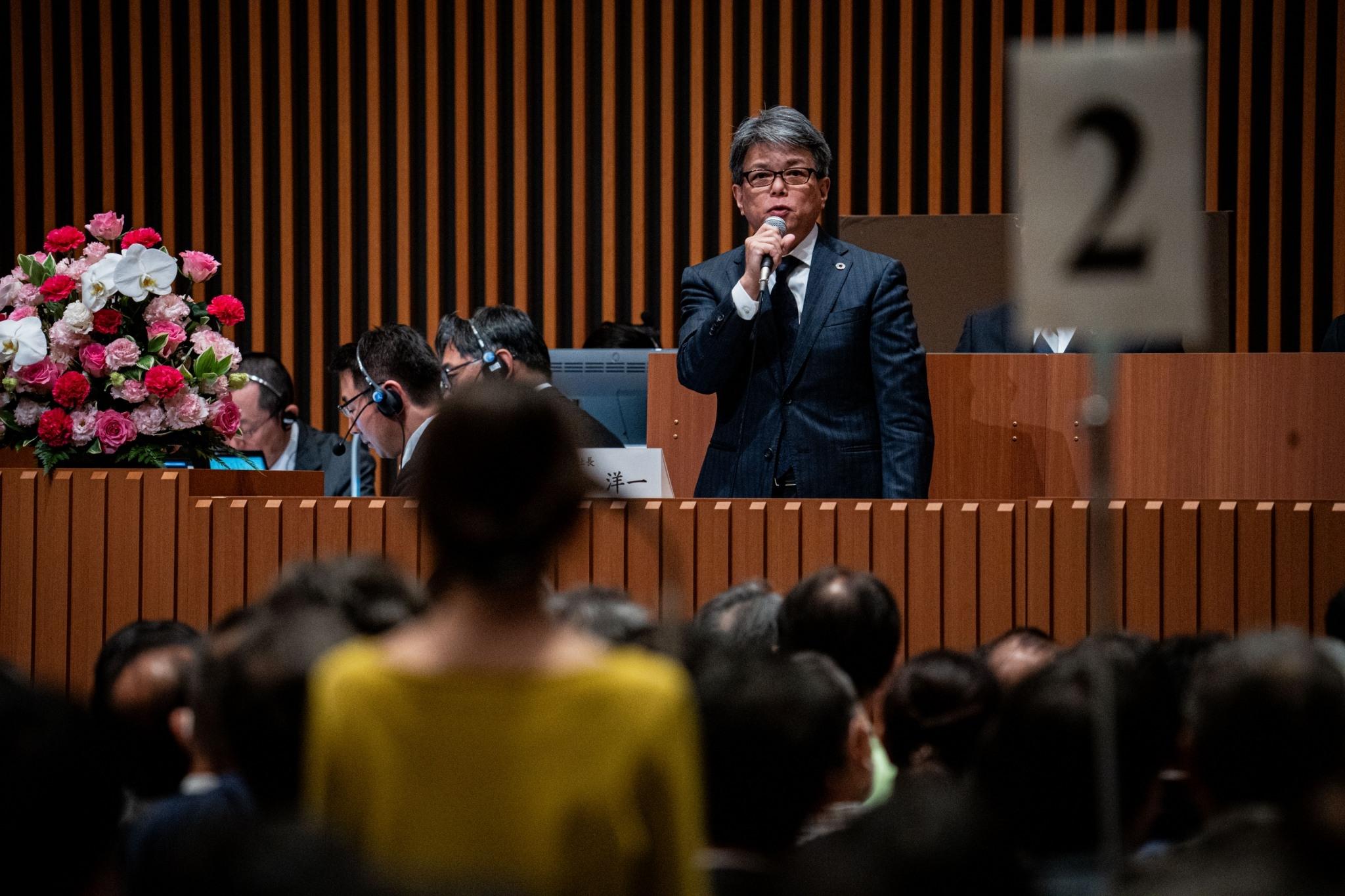
As part of our feature on the 2024 General Shareholders’ Meeting, this time, we’re highlighting a dialogue with shareholders about the redistribution of profits centered on comments by Executive Vice President Yoichi Miyazaki.
He spoke about the business foundations inherited from Chairman Akio Toyoda and his determination to make the auto industry an even more exciting sector.
Is Toyota only looking out for itself?
A month prior to the general meeting, Toyota announced an operating income of 5.3529 trillion yen for the fiscal year to March 2024. While a weak yen also played in the company’s favor, this result stems from the product- and region-centered management established together with Toyota’s stakeholders.
At the meeting, shareholders wanted to know how profits would be passed on to those stakeholders.
Vice President Miyazaki

Toyota is working to strengthen its business foundations and produce happiness for all through our product- and region-centered management.
On a personal note, prior to receiving my current role, I spent many years supervising our overseas business and was based abroad as Chief Officer for the Asia region. During that time, I had the experience of working with suppliers, dealers, and local communities as we supported and helped each other through the challenging circumstances of a pandemic, chip shortages, and natural disasters.
I believe it is thanks to these relationships of mutual gratitude in each country and region—along with the ongoing support of the 100 million global customers who choose Toyota vehicles and our shareholders, who have now grown to number 1 million—that the company has achieved sustained growth to this day.
At the same time, our consolidated staff has increased by 60,000 employees. Based on average annual salaries in Japan, this amounts to generating additional returns of some 300 billion yen per year. With the rise in our stock valuation, Toyota’s market capitalization is currently nearing 50 trillion yen. Once again, I would like to express my deepest appreciation for your support.
As pointed out, our consolidated results for the past fiscal year included sales of 45 trillion yen, with 5 trillion yen in income. The difference of 40 trillion yen consists mainly of the costs we paid to our suppliers for parts and equipment, returns to employees, and contributions to national and regional governments in the form of tax payments. In addition, the year’s income helps to fund the dividends paid to you, our shareholders.
The auto industry is known for having very widespread roots, with its economic ripple effect said to be 2.5 times greater than the industry itself. We believe that we have contributed to economic ripple effects totaling nearly 100 trillion yen. Even as Japan’s GDP remains stagnant, Toyota’s returns to stakeholders have tripled (over the past 20 years).
It gives me great pleasure to know that Toyota’s hard work and growth can be used to give back and repay all those who support us, helping Japan become a more vibrant country.
Over the past 15 years, I have been entrusted with the genba where products evolve and where members have regained their smiles and confidence. I have also witnessed the growth of our overseas colleagues.
Similarly, regarding the current certification issues, all of our employees are united as one, working to make sure that the results speak for themselves. As the past 15 years, we will strive to maintain our unique growth and returns, ensuring you can all be proud to stand by Toyota for a long time to come. We look forward to your continued support.
The “15 years” that Miyazaki spoke of overlap neatly with Akio Toyoda’s term as president (2009-2023).
In responding to the shareholder’s question, Vice President Miyazaki touched on his own genchi-genbutsu experience during that time, while also providing figures on employment, tax payments, and Toyota’s other economic ripple effects.
When the company reports strong performance, it is often criticized as only looking out for itself. Indeed, at this year’s general meeting, shareholders again commented that the financial results had sparked talk of a “winner-takes-all” attitude.
For Toyota, however, “winning” means redistributing profits to the auto industry and, thereby, the countries and regions where it operates.
Take the following words, spoken at a general shareholders’ meeting by then-President Toyoda. He was responding to a suggestion that suppliers and dealerships might be unhappy with the way Toyota alone was raking in profits.
Then-President Toyoda

I’ve heard people talk of Toyota’s “winner-take-all” attitude, but what would happen if this country had no winners at all?
And what use would winning be for that sole company?
I believe that Toyota is transforming into a company capable of using this strength not for our own sake, but to benefit the people who continually support us and the wider world.
Without any winners, I don’t think this industry nor this country can be sustained.
We couldn’t even sustain our goal of being “best in town.”
(2020 General Shareholders’ Meeting)
This time, too, Vice President Miyazaki emphasized that Toyota had grown through mutual support with various stakeholders and asked the shareholders to acknowledge the significant role it plays in the economy and society.
Achieving sustainable growth
What, then, must be done to sustain growth for Toyota and the auto industry as a whole?
As the manufacturing sector grapples with chronic worker shortages, how is Toyota approaching this problem? Once again, Vice President Miyazaki took up the microphone.
Vice President Miyazaki

I believe that, in order for a company to grow sustainably, it must create a vibrant, fun, dynamic environment where every employee can apply themselves to their work while harnessing their individuality.
To do that, first we need to create conditions that make us a company people want to join and work for. From there, we must firmly establish systems and infrastructure that ensure individuals remain fulfilled and highly motivated to continue giving their best for a long time. That’s what we are currently working on.
To create a supportive work environment where diverse individuals can flourish regardless of age, gender, or physical ability, we are enhancing toilets, dormitories, and company housing, and promoting childcare leave for both male and female employees. Efforts are also underway to reduce workloads by redesigning vehicle structures and production line processes.
At the same time, given the auto industry’s extremely broad roots, the labor force issue affects not only us but also our suppliers and the industry as a whole. To boost the entire sector’s appeal and inspire people to join our 5.5 million colleagues, we are focused on ensuring that the effects of wage increases reach our primary, secondary, and tertiary suppliers and far beyond.
At Toyota, we believe people are priceless and employees are family. Toyota cannot create the auto industry’s future alone. We want to work with many others to build the future, pass on our skills and technologies across the industry, and continue developing Japanese monozukuri. To that end, we will keep investing heavily in people. I hope we can count on your continued support.
“Investing in people” was also a key topic raised at this year’s labor-management discussions. At the third round of talks in March, participants shared issues related to heat management in production plants and working conditions for logistics area contractors. Then, in April, dealers and suppliers joined in the first “expanded labor-management roundtable” as part of improvements targeting the entire auto industry.
As for the idea that “employees are family,” this stems from the words of Kiichiro Toyoda, who founded the Toyota Motor Corporation. The company’s Five Main Principles* include the following:
“Always strive to build a homelike atmosphere at work that is warm and friendly.”
*The teachings of Group founder Sakichi Toyoda, compiled by Kiichiro Toyoda and others.
Vice President Miyazaki’s responses revealed a commitment to building on not just the company’s business foundations, but also their underlying spirit, for the benefit of future generations.
Source: https://toyotatimes.jp/
